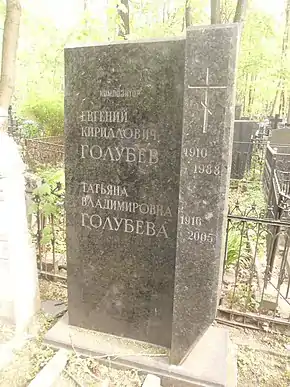Evgeny Golubev
Yevgeny Kirillovich Golubev (Russian: Евге́ний Кири́ллович Го́лубев[1]) (16 February 1910 – 25 December 1988) was a Soviet and Russian composer.

Golubev was born and died in Moscow. He was taught by Nikolai Myaskovsky,[2] and his students included Iosif Andriasov from 1958 till 1963, Alfred Schnittke, who studied with him from 1953 until 1958,[3] Asya Sultanova, and Michael L. Geller. His own compositions included at least twenty-four string quartets,[4] seven symphonies, three piano concertos - the last dedicated to and recorded by Tatiana Nikolayeva -, concertos for violin, cello and viola, ten piano sonatas (the sixth dedicated to Myaskovsky), sonatas for violin, cello and for trumpet (1956) (the latter dedicated to Sergei Nikolaevich Yeryomin),[5] and quintets for strings with piano and with harp, among other works. This harp quintet is one of Golubev's few works that are still occasionally performed.
The Soviet state record label Melodiya released several LPs of his music, including the three piano concertos, two of the symphonies, and some chamber works and songs which are no longer easily available. During the last years, some of these old recordings were released on CD. Melodiya has in 2005 reissued Nikolayeva's recordings of the 3rd piano concerto and 4th piano sonata (1942–1943).[6]
Selected works
Symphonic
- Symphony no. 1 op. 11 (1933, rev. 1950)
- Symphony no. 2 op. 17 (1938, rev. 1973)
- Symphony no. 3 op. 21bis (1942, rev. 1974)
- Symphony no. 4 op. 28 (1947)
- Symphony no. 5 in A minor op. 45 (1960)
- Symphony no. 6 op. 51 (1966)
- Symphony no. 7 in B minor op. 67, ‘Heroic’ (1972)
- Ukrainian Rhapsody in G minor, op. 81 (1982)
Concertante
- Piano concerto no. 1 in A minor op. 24 (1944)
- Piano concerto no. 2 in D flat op. 30 (1948)
- Piano concerto no. 3 in G minor op. 40 (1954)
- Cello concerto in D minor, op. 41 (1956)
- Violin concerto in D minor op. 56 (1970)
- Viola concerto op. 57 (1962)
Stage works
- Ballet – Одиссей (The Oddysey) (1965)
- Oratorio – Возвращение солнца (Return of the Sun) op.12, Sami folk tale (1936, rev. 1980)
- Oratorio – Герои бессмертны (Immortal Heroes) op. 25 (1946, Stefanovich/Gorodestky)
Chamber works
- 24 string quartets (1931-1986)
- Piano quintet op. 20 (1938)
- Quintet for harp and string quartet in C minor op. 39 (1953)
- Quartet for two flutes and two harps op. 49 (1963)
- Violin sonata op. 37 (1952)
- Cello sonata op. 60 (1972)
- Trumpet sonata in E flat op. 36/1 (1951)
Piano
- 10 sonatas (1930-1977)
- Ukrainian rhapsody op. 14 (1936)
- Triptych for piano or organ op. 85 (1985)
- 5 pieces in memory of M. Lermontov (1939)
- Children’s album (1945–46)
- Additional smaller pieces
Vocal
- Works for voice and piano
- Works for unaccompanied chorus
- Russian folk songs, etc.
References
- Just Евгений Кириллович Голубев according to Worldcat, with fewer diacritics.
- Tassie. Nikolai Myaskovsky: The Conscience of Russian Music, p.282, e.g.
- ,
- OCLC 225661139 refers to a publication of his last two string quartets, nos. 23 and 24, opp. 87 and 89 (published in 1988.)
- Akhmadullin, Iskander (May 2003). "The Russian Trumpet Sonata: A Study of Selected Representative Sonatas for Trumpet and Piano with an Historical Overview of the Russian Trumpet School. Doctor of Musical Arts" (PDF). University of North Texas: 12–13, 28. Retrieved 2007-11-14.
{{cite journal}}: Cite journal requires|journal=(help) - Here is a link to the album on Melodiya's own website.
External links
- Golubev Worklist and Information by Onno van Rijen at the Wayback Machine (archived 18 August 2016)